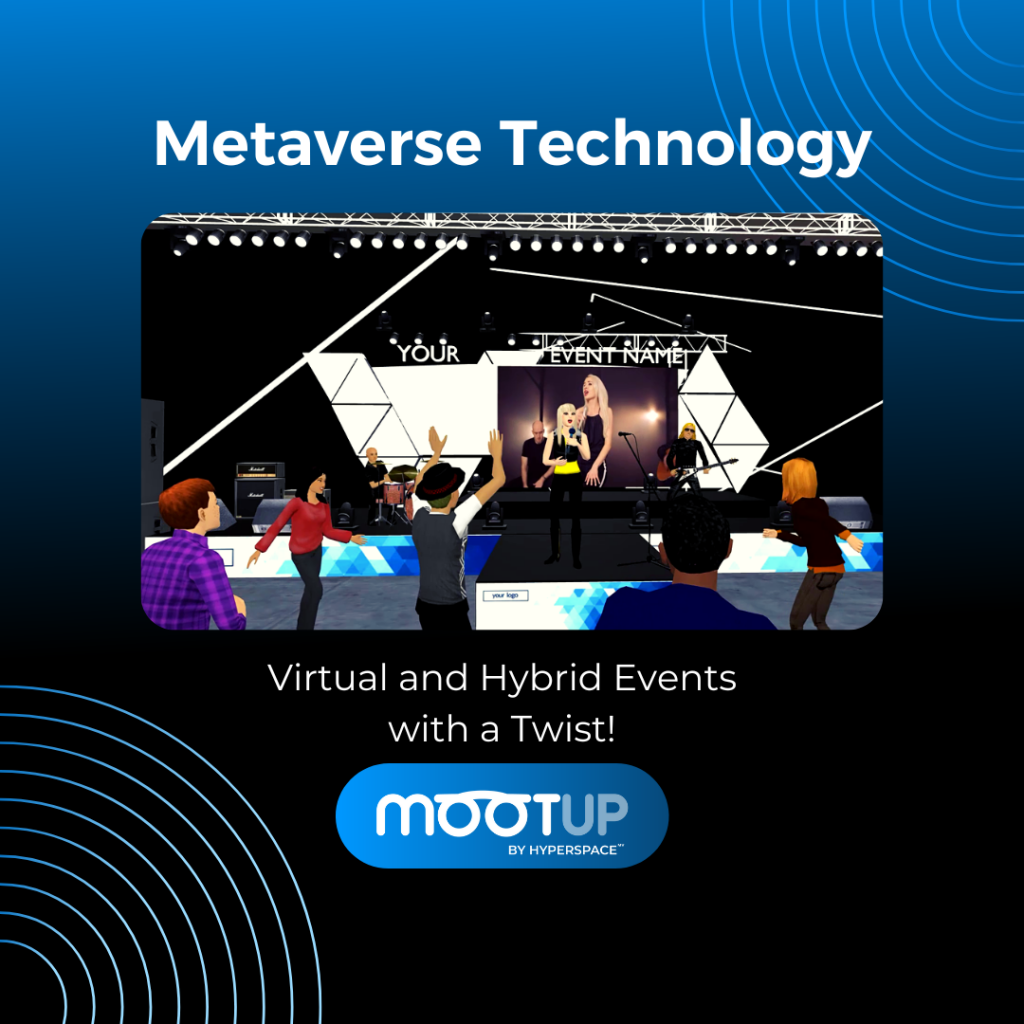Are you looking to host the best virtual event? From planning and executing a successful online experience to understanding how to create a unique virtual event that stands out from the rest, there are many considerations for hosting large-scale events in the metaverse.
Discover the tips and best practices needed to craft the best virtual event for a truly remarkable event, such as an unforgettable virtual Halloween or any other special occasion. Gain insight into the necessary components for crafting an extraordinary event that your attendees will remember.
Table of Contents:
- What is a Virtual Event?
- How to Plan and Execute a Successful Virtual Event
- Tips for Hosting an Amazing Virtual Event
- Best Practices for Hosting Large-Scale Virtual Events
- FAQs in Relation to the Best Virtual Event
- Conclusion
What is a Virtual Event?
What is a Virtual Event?
An event that takes place in the digital realm rather than physically is known as a virtual event. Any company planning to host the best virtual event can organize it remotely, eliminating the need for physical presence while providing an engaging and interactive experience. Best virtual event gain traction due to their affordability and ease of access compared to in-person gatherings. Remote participants can join the event anytime, regardless of their geographical position.
Definition of a Virtual Event:
A virtual event is an interactive experience that takes place entirely online through video conferencing technology such as Zoom or Webex. It typically includes features such as live streaming sessions, chat rooms, surveys and polls, networking opportunities, and more. Participants can join from anywhere with internet access on any device they choose – laptop/desktop computer, tablet, or smartphone – making it accessible for anyone who wishes to attend regardless of geographical location or physical ability level.
Organizers today have a range of virtual events to choose from, such as corporate meetings and seminars, educational lectures and workshops, product launches, job fairs, concerts, trade shows, festivals, and hackathons. Each offering has its own unique set of experiences tailored to the purpose or objective of the event.
All participants need is an internet connection on any device they wish to use – laptop/desktop computer, tablet, or smartphone – making it easily accessible for anyone regardless of their geographical location or physical ability level.
Hosting a virtual event can be cost-effective as there are no travel or venue rental expenses, allowing organizations to expand their reach while keeping costs low. Additionally, they offer increased flexibility when it comes to scheduling since attendees don’t have time constraints related to commuting which makes them ideal for those with busy schedules who may not be able to make it otherwise.
Furthermore, they provide greater accessibility than ever thanks to their remote nature, meaning those living in rural areas where there may not be much happening can still participate in exciting activities elsewhere around the globe. Finally, having your own dedicated platform for virtual event planning allows you complete control over how you present your content providing custom branding options so you can create memorable experiences explicitly tailored towards your target audience every single time.
With a cost-effective approach, the best virtual events make engaging your target audience possible. With the proper planning, you can create a successful virtual event that will make lasting impressions on attendees. Now let’s look at what planning and executing a successful virtual event
Key Takeaway: With their affordability and ease of access, virtual events are growing in popularity, enabling participants from all corners of the globe to partake in interactive experiences. They offer greater flexibility when it comes to scheduling, increased accessibility than ever before, and complete control over how you present your content – allowing organizations of any size to host memorable online events without breaking the bank.
How to Plan and Execute a Successful Virtual Event
When planning and executing a successful virtual event, it is essential to set goals and objectives. This helps ensure the event meets its intended purpose and delivers desired results. Goals should be SMART: specific, measurable, attainable, relevant, and time-bound. Objectives should outline what needs to be accomplished in order to reach the goal. They can include increasing engagement or attendance numbers, creating brand awareness, or generating leads.
When it comes to virtual events, selecting the right platform is key. Platforms like Zoom or Google Meet are great for webinars but lack interactive features; on the other hand, more advanced platforms such as Hopin offer a wealth of capabilities that can really make your event stand out from the crowd.
You’ll get access to live streaming multiple sessions at once, breakout rooms for networking opportunities, and gamification elements such as polls and quizzes to keep attendees engaged throughout their experience – not forgetting an array of other tools. Choosing the right platform is essential for creating an outstanding virtual event.

Creating engaging content for your audience is key when hosting a successful virtual event. Content should be tailored specifically towards their interests so they feel connected during the session. It is also important to use visuals whenever possible – infographics work great here – and provide helpful resources, such as handouts or cheat sheets that attendees can refer to after the session ends.
Finally, consider adding interactive elements like Q&A sessions with experts or panel discussions featuring industry leaders, which will help keep audiences engaged throughout your presentation.
Planning and executing a successful virtual event requires careful consideration of goals, objectives, platforms, content, and technology. With the right tips for hosting a unique virtual event experience – from leveraging technology to offering unique experiences – your audience will be sure to stay engaged.
“Planning a successful virtual event? Set SMART goals, choose the right platform & create engaging content to make your event stand out from the crowd.” #VirtualEvents #EventPlanningClick to Tweet
Tips for Hosting an Amazing Virtual Event
Leverage Technology to Enhance the Experience:
To host a fantastic virtual event, you must leverage technology in creative ways. Various options are available for engaging your audience, from interactive polls and surveys to live Q&A sessions. You can also utilize webinar software or video conferencing platforms to create a more engaging atmosphere for your attendees. For a more immersive experience, you could employ augmented reality to create 3D environments where attendees can engage with objects or participate in scavenger hunts.
Make the most of social media to boost your virtual event by creating tailored content, utilizing hashtags, and leveraging influencers. Create content specifically tailored for each platform and use hashtags to increase visibility and engagement with potential attendees. Try leveraging influencers within your industry with large followings on their respective channels as well; this will help spread awareness about your event even further.
It’s vital that you offer something unique at your virtual events if you want them to be successful. Think outside the box when creating activities for attendees – from cooking classes and game shows to online trivia nights – plenty of fun ideas are out there. Additionally, try providing exclusive access or discounts on products related to the topic of discussion during the event; this is sure to keep people engaged throughout its duration.
By applying the suggested tips, event professionals can ensure their virtual events are truly unforgettable. For large-scale events, it’s important to consider the best practices outlined in the next heading for optimal success.
#VirtualEvents don’t have to be boring. Leverage tech, use social media & offer something special for an amazing experience. #EventPlanning #EventManagementClick to Tweet
Best Practices for Hosting Large-Scale Virtual Events
Hosting a large-scale virtual event requires careful planning and execution. To ensure the success of your event, it is important to establish clear communication protocols with attendees and speakers, designate roles and responsibilities ahead of time, and utilize automation tools to streamline processes.
When setting up communication protocols for your virtual event, be sure to provide detailed instructions on how attendees can access the platform or software you are using. Additionally, ensure that all speakers have the necessary equipment for their presentations and access to any relevant materials they may need during their presentations.
Assigning specific duties in advance will guarantee that all organizers of the event understand their responsibilities before, during, and after it occurs. It is also important to assign someone who will be responsible for moderating questions from attendees so that all queries are answered promptly. Finally, consider utilizing automation tools such as scheduling software or chatbot technology which can help reduce the manual labor associated with running an online conference or seminar.
Measuring the success of a virtual event requires collecting feedback from attendees and speakers post-event and analyzing data from pre-event surveys sent out before registration opens up. Additionally, virtual events require tracking engagement metrics throughout the duration of your virtual event to give you insight into how successful it was in terms of viewership numbers and audience participation levels, which can then be used when planning future events.
Implementing these top-rated tips for hosting a large-scale virtual event will provide you peace of mind that everything is handled before the launch day for the best virtual event experience.
Key Takeaway: Planning a successful virtual event requires establishing clear communication protocols, assigning roles and responsibilities ahead of time, utilizing automation tools for efficiency, collecting feedback post-event to measure success, and tracking engagement metrics throughout. By proactively managing the details of your event, you can guarantee a smooth and successful outcome.
FAQs in Relation to the Best Virtual Event
What is the advantage of a virtual event?
The cost-efficiency, convenience, and reach of virtual events surpass traditional in-person ones, making them an attractive option for event organizers. They allow for greater flexibility with event planning and the ability to customize content delivery. Virtual events enable interactive engagement between participants through chat functions and video conferencing technology.
Additionally, virtual events offer more data collection capabilities which can be used to measure success metrics such as attendee satisfaction or ROI on marketing campaigns.
How can a virtual event be successful?
A successful virtual event requires careful planning and execution. Creating an engaging experience for attendees is important by creating a visually stimulating environment, providing meaningful content, utilizing interactive features such as polls or chatrooms, and offering networking opportunities.
The technical aspects must be appropriately set up and running smoothly to ensure a successful event guarantees an optimal user experience. Finally, effective promotion should be done to increase attendance numbers before the event. With these considerations taken into account, virtual events can be just as successful as traditional ones.
How do you make a virtual event exciting?
Virtual events can be made exciting by incorporating engaging elements that keep the audience engaged and entertained. This could include interactive activities such as live Q&A sessions, virtual game shows, trivia competitions, polls, and surveys to gather feedback from attendees.
Additionally, providing visual stimulation through videos or 3D graphics is a great way to capture people’s attention. Finally, offering unique experiences such as virtual tours of museums or other attractions will ensure your event stands out from the crowd.
Why are virtual events better than physical events?
Virtual events offer numerous advantages over physical events. Compared to physical events, virtual ones require significantly fewer resources for both hosting and attending. Attendees of virtual events can join from any corner of the world, regardless of their geographical or temporal boundaries.
Virtual event requires organizers can utilize analytics software, which gives them an immediate understanding of how their audience engages, providing beneficial knowledge. Finally, virtual events are less likely to be disrupted due to unexpected circumstances such as bad weather or political unrest than physical gatherings, potentially leading to safety concerns for participants.
Conclusion
You can ensure your attendees have an amazing time by leveraging the right tools, strategies, and best practices to create a memorable virtual event experience through no-code platforms in the metaverse or interactive activities like gamification with live speakers. By utilizing no-code platforms like MootUp to produce hybrid events in the metaverse and focusing on creating engaging experiences for participants through creative activities like gamification or interactive sessions with live speakers, you will indeed host one of the best virtual events out there.
Try MootUp, the no-code platform that helps you produce and host virtual and hybrid events in the metaverse. Experience a new level of engagement with your audience through our best virtual event solutions.

